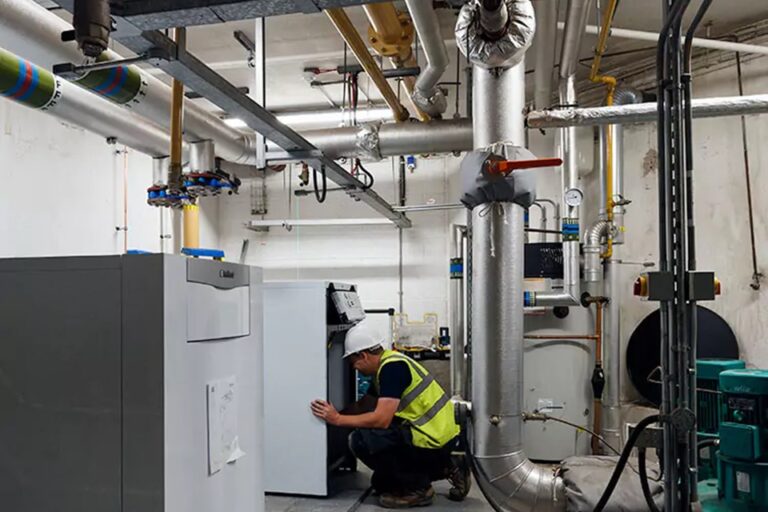Upgrading to a new commercial boiler can offer several benefits, such as improved energy efficiency, lower operational expenses, and better heating and hot water supply in commercial buildings. A new boiler installation can also enhance the occupants’ comfort and productivity while reducing the building’s environmental impact.
However, ensuring that an experienced and reliable service provider handles the commercial boiler installation is crucial. An improper installation can result in several performance issues, safety hazards, and higher operational costs. For instance, the boiler may not function optimally, leading to increased energy consumption and frequent breakdowns. This can add to the operating expenses and the inconvenience of the occupants.
Understanding The Basics Of Commercial Boilers
When considering the installation of a commercial boiler, it’s essential to start with the basics. Commercial boilers are robust systems designed to provide heating solutions for large spaces such as offices, factories, and shopping centres. Unlike their residential counterparts, these boilers handle higher demands, offering more power and efficiency for extensive usage.
There are several commercial boiler types, each with unique features and benefits. The most common types include gas, electric, and oil-fired boilers. Gas boilers are popular for their efficiency and cost-effectiveness, making them a preferred choice for many businesses. On the other hand, electric boilers are known for their clean operation and ease of maintenance, though they can be more expensive. Oil-fired boilers are often used where natural gas isn’t readily available.
The operation of commercial boilers revolves around the principle of heating water to produce steam or hot water, which is then circulated through a system of pipes and radiators to heat a building. This process is crucial for creating a comfortable indoor environment and, in some industries, for powering equipment and industrial processes.
When selecting a commercial boiler, it’s essential to consider factors like the size of the space, the energy source available, and the heating requirements of the building. The right size and type of boiler can significantly impact not only the comfort level within the commercial space but also the efficiency and cost of operation. An oversized or undersized boiler can increase energy consumption and operational costs, highlighting the importance of accurate assessment and selection.
Key Considerations For Commercial Boiler Installation
Installing a commercial boiler is a big decision, requiring careful consideration of several key factors to ensure the system operates efficiently, safely, and in compliance with legal standards.
- Site Assessment: The first step in boiler installation is a thorough site assessment. This involves evaluating the space where the boiler will be installed, including size, ventilation, and access for maintenance. It’s crucial to ensure that the installation site can accommodate the boiler’s dimensions and output requirements without compromising safety or efficiency.
- Choosing the Right Size and Capacity: One of the most critical decisions in the installation process is selecting the right size and capacity of the boiler. This depends mainly on the size of the building and the heating demand. An oversized boiler can lead to unnecessary energy consumption and higher operational costs, while an undersized one may fail to heat the space adequately. Consulting with a professional to calculate heat load correctly is essential for making an informed decision.
- Fuel Type and Availability: The choice of fuel type is influenced by factors such as cost, availability, and environmental considerations. Natural gas boilers are popular due to their efficiency and lower environmental impact. Still, alternatives like oil or electric boilers might be more suitable in areas where gas is unavailable.
- Energy Efficiency Considerations: Modern commercial boilers come with various energy efficiency ratings. Opting for a high-efficiency boiler can significantly reduce energy costs and carbon footprint. It’s essential to balance the upfront cost of a more efficient boiler with the long-term savings in energy bills.
- Compliance with Regulations: Compliance with local building codes and regulations is non-negotiable. This includes ensuring the installation meets safety standards, emission guidelines, and energy efficiency requirements. UES are well-versed in these regulations and can ensure that your installation is compliant.
- Professional Installation: Finally, the complexity of commercial boiler systems necessitates professional installation. Certified engineers have the expertise to install the system correctly, ensuring optimal operation and adherence to safety standards. They can also provide valuable advice on the best type and size of boiler for your specific needs.
Maintenance & Safety
Proper maintenance is vital for the longevity and efficiency of commercial boilers. We recommend annual servicing to ensure optimal performance. Annual servicing includes checking for leaks, inspecting pipes and radiators, and cleaning the boiler to prevent
build-up that can hinder efficiency. It’s also crucial to monitor water levels and pressure gauges regularly.
Safety is paramount. Always ensure your boiler system has carbon monoxide detectors and emergency shut-off features. Regular safety checks by qualified professionals can identify potential hazards, such as gas leaks or faulty valves. Adhering to these maintenance and safety protocols not only prolongs the life of your boiler but also protects the well-being of those within the building.
Conclusion
In conclusion, a well-planned and executed commercial boiler installation is crucial for efficiency and safety. By understanding the basics, considering key installation factors, and adhering to maintenance and safety protocols, you can ensure a reliable heating solution for your commercial space.


